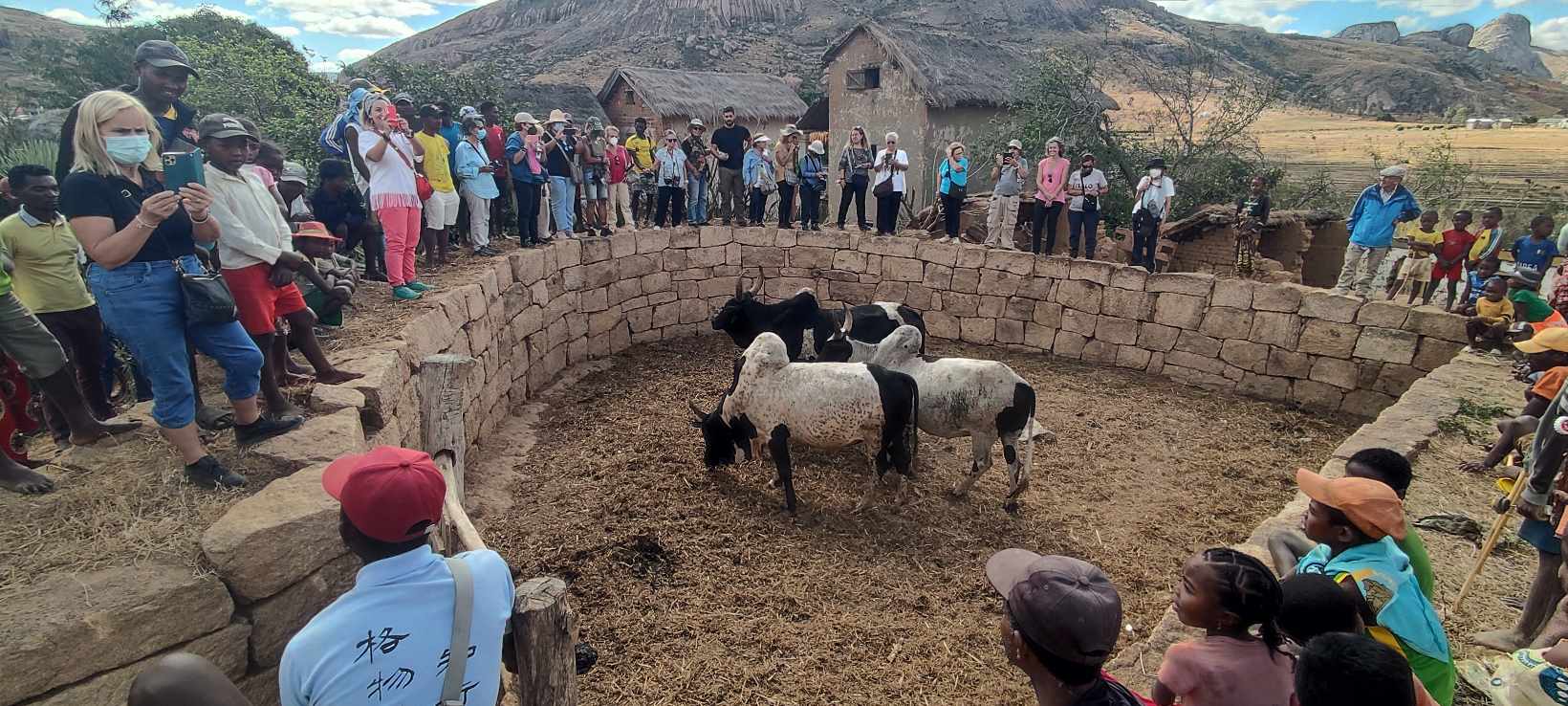Savika is a traditional practice emblematic of the Betsileo region, located in the highlands of Madagascar, where the young men of the community compete against zebus. This unique form of bullfighting symbolizes not only the bravery and strength of the Betsileo men, but also their deep respect for their ancestral traditions and culture. All Betsileo people, men and women, children and elders, enjoy the sport. A major tournament is even organized once a year in Ambositra, south of the capital Antananarivo.
Origins and cultural significance :
Savika has its origins in the ancient rituals of the Betsileo ethnic groups, where it was originally practiced to demonstrate the valor and courage of young men. Through this tradition, they prove their ability to protect and provide for their community, or currently their respective families. Zebus, symbols of wealth and prestige in Malagasy society, play a central role in these ceremonies, and it is strictly forbidden to kill them during the fight. Facing a zebu in an arena is considered a rite of passage, a way of proving one’s strength and skill.
Today, Savika has become a national sport with many spectators, and is organized at every family or community event in the southern part of the Malagasy highlands.
The Savika process :
Savika generally takes place during important festivals and events, when young Betsileos are keen to demonstrate their strength, such as weddings, circumcisions, funeral feasts or village festivals. The participants, called “Mpiavy”, enter the arena, often dressed in colorful traditional outfits. They practice savika with their bare hands, and safety within the arena is ensured by other participants equipped with sticks.
The challenge is to grab the bovine’s neck or hump and hold on for as long as possible, at least thirty seconds, while avoiding the animal’s horns and kicks, and if possible, bringing it to the ground. Unlike Spanish bullfighting, the aim of the Savika is not to injure or kill the zebu, but to show mastery and resilience in the face of the beast. The winner receives no trophies or medals, but the respect of the family and community. The winner is hailed as a true hero. In fact, some Savika practitioners proudly display their wounds and scars from confrontations with zebus during the Savika.
Preservation of the Tradition :
Savika techniques and know-how cannot be learned, but are passed down from generation to generation, from father to son. But at a time when globalization threatens to dilute local cultural identities, the preservation of Savika is becoming essential. Numerous sports and cultural associations are determined to preserve this tradition, while at the same time calling for Savika to be further codified.
Various initiatives have been set up to protect and promote this tradition. Cultural festivals, public demonstrations and educational programs aim to raise awareness of the importance of Savika among the younger generation. These efforts are crucial to keeping this ancestral practice alive, while ensuring that it evolves to meet modern animal welfare standards, so that it can be exported abroad.
If Savika is still preserved today, it’s also thanks to tourism. Organizing a demonstration every time tourists visit Ambositra can boost the region’s economic development and generate income from donations and visitor participation.
A value and tradition that serves to educate :
Today, Savika continues to captivate locals and foreign visitors alike. It has become a symbol of pride and identity for the Betsileo, attracting many tourists curious to discover this tradition. However, it is crucial to stress that this practice must respect the well-being of the zebus. Ongoing efforts are needed to maintain Savika as a celebration of culture and courage, and to ensure that the animals are treated with respect.
In the central highlands, where there is a large zebu breeding center, this traditional sport remains a means of educating young people in preparation for adult life. It plays an essential role in their training and personality development, demonstrating to the community, spectators and themselves qualities such as virility, risk-taking, skill and personal style. Participants also use Savika to honor the prestige of their ancestors, their group, their clan, their team and their entire village.
Savika today :
The Savika, much more than a simple display of bravery, is a cornerstone of Betsileo cultural identity. By perpetuating this tradition, the Betsileos honor their ancestors and pass on a rich heritage to future generations. Today, preserving Savika is essential not only for Betsileo culture, but also for Madagascar’s cultural heritage as a whole.
Despite several initiatives to promote and preserve Savika, the challenge is not only to adapt it to modern developments, but also to combat cattle rustlers, known as “daholo”. These small groups of heavily armed individuals can wreak havoc wherever they go, being capable of stealing several hundred zebus for resale on clandestine markets for slaughter.






